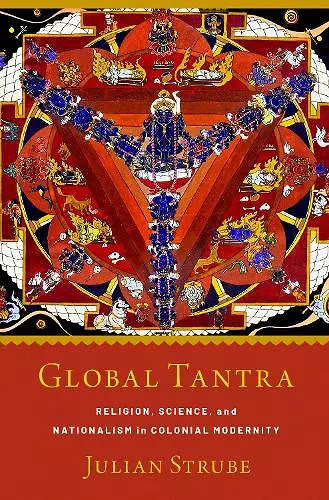Global Tantra
Format:Hardback
Publisher:Oxford University Press Inc
Published:25th Aug '22
Currently unavailable, and unfortunately no date known when it will be back

Tantra has formed an integral part of Asian religious history for centuries, but since "Arthur Avalon" introduced the concept to a global readership in the early twentieth century, Tantric traditions have exploded in popularity. While it was long believed that Sir John Woodroffe stood behind Avalon, it was in fact mainly a collaboration between learned South Asians. Julian Strube considers Tantra from the Indian perspective, offering rare insight into the active roles that Indians have played in its globalization and re-negotiation in local Indian contexts. In the early twentieth century, Avalon's publications were crucial to Tantra's visibility in academia and the recognition of Tantra's vital role in South Asian culture. South Asian religious, social, and political life is inexorably intertwined with various Tantric scriptures and traditions, especially in Shaiva and Shakta contexts. In Bengal, Tantra was central to cultural dynamics including Vaishnava and Muslim currents, as well as universalist tendencies incorporating Christianity and esoteric movements such as New Thought, Spiritualism, and Theosophy. Global Tantra contextualizes struggles about orthodoxy and reform in Bengal, and explores the global connections that shaped them. The study elides boundaries between academic disciplines as well as historical and regional contexts, providing insights into global debates about religion, science, esotericism, race, and national identity.
Global Tantra is an important and original book that shows the complex exchanges and entanglements between East and West that helped shape the modern category of "Tantra." Strube sheds new light on the key role played by movements such as the Theosophical Society and authors such as John Woodroffe and his Indian collaborators. The book should be of real interest both to general readers and to scholars of religious studies, South Asian studies, globalization studies, and other disciplines. * Hugh B. Urban, Distinguished Professor, Department of Comparative Studies, The Ohio State University *
In Julian Strube's delightful book, the modern manifestations of Tantra shimmer like beads of dew on a sun-drenched spiderweb; the critical eye wanders and wonders in turn. Here are the Theosophists, there are the Spiritualists; now the Orientalists, then the Brahmos; look at the Mesmerists and the Aryas, the nationalists and the feminist emancipators; Oxford comparativists and their neglected counterparts in Bengal's district towns. But wait, Global Tantra also reminds us that Indra's Net is an illusion. To look for modern Tantra you will have to look elsewhere, again and again. * Brian A. Hatcher, author of Hinduism Before Reform *
Julian Strube's reconstruction of Tantra in colonial Bengal offers fascinating new vistas of the recent religious history of the Indian subcontinent. It places the debates on Tantra in a global context by thoroughly investigating Bengali and English sources side by side with all their internal implications and international ramifications. Further throwing open the black box called Arthur Avalon, Strube redistributes agency among Bengali and international players, making the story more Bengali and more global at the same time. This book, in its unpretentious and appealing style, has the potential to lift the state of the art in the colonial history of Tantra to a new level. * Hans Harder, Professor of Modern South Asian Languages and Literatures, South Asia Institute at Heidelberg University, Germany *
ISBN: 9780197627112
Dimensions: 164mm x 242mm x 31mm
Weight: 739g
358 pages